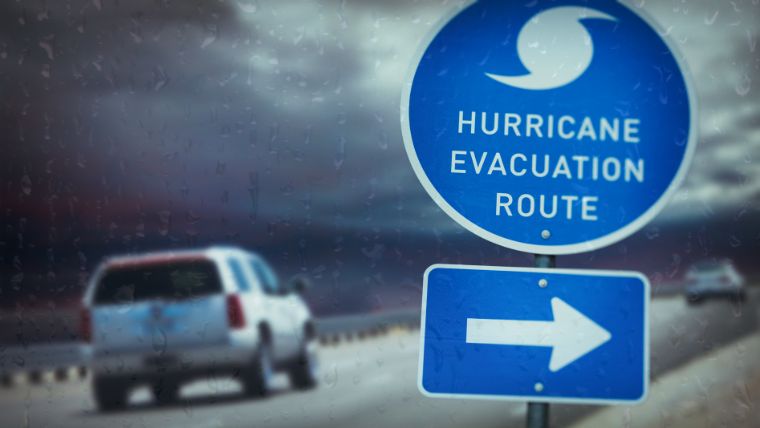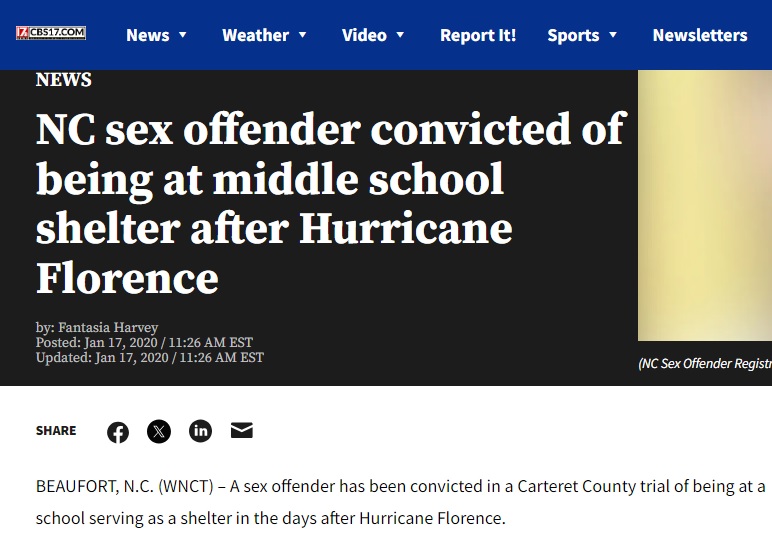Stop discrimination against registrants in emergency situations
By Sandy . . . .Even before Hurricane Helene entered the Gulf of Mexico, plans for emergency sheltering for those fleeing flood areas were well underway, the plans of both those assuring that the shelters were up and running and those who would be doing the fleeing.

With time now measured in hours rather than days, preparations have become more focused. Imagine the uneasiness, even fear that would be felt by those involved, the questions they would have, and the concerns for family members and young children.
Imagine that time, fear, and stress being doubled, tripled, or quadrupled in families with a member listed on a state sexual offender registry. What would happen? Would the family be separated or turned away if they were determined to stay together?
Those are the questions and the feelings being experienced by many, even as I am typing this. With every passing minute, the expectation of a direct hit grows, aimed directly at Florida, with both torrential rains and extreme winds expected. Florida’s law governing this situation is long and thorough:
Florida: § 685.101. Temporary emergency shelters; sexual predators and offenders notification requirements.
Any person who is required by Florida law to register as a sexual predator or sexual offender and who utilizes or intends to utilize a temporary shelter provided by any public or private entity and established as a result of any emergency or incident or threatened emergency or incident shall, immediately upon entering the shelter, notify the individual or individuals operating the shelter that he or she is a registered sexual predator or sexual offender. The sexual predator or sexual offender shall be assigned to a temporary shelter specifically designated for use by sexual predators and sexual offenders.
The Sheriff may designate a public building or a jail or other correctional facility as a temporary shelter to be utilized by sexual predators and sexual offenders.
Failure of a sexual predator or sexual offender to make notification as required in Section (b) shall constitute a Class D offense.
When a member of the Florida Action Committee was asked what this translated to in real practice, she said, “Hurricanes are county by county in how they deal with our registered population. We’ve made many improvements over the years. We do get cooperation from probation, and if you’re not on paper, you go where you’ll be safe and report as soon as possible when it’s safe to do so. Some counties have shelters that allow them to go in, while others do not. It’s a web, as is everything else.”
Georgia, Alabama, North Carolina, and South Carolina are also expected to experience excessive rain and flooding in some areas. None of these states appear to have specific provisions in state law regarding registrants in weather-emergency shelters.
This is unfortunate as the control is left in the hands of local sheriffs, which creates a wide disparity of policies. Most officials are reluctant to be seen as callous enough to just let people die, and they provide alternate accommodations, often jails or buildings that house jails. There have actually been cases of registrants being arrested for being present on school property that was being used as an emergency shelter.
Contacts in Georgia were determining how the sheriffs would handle the situation in the various counties that would be affected. Registrants who are under community supervision could experience the most difficulty.
North Carolina RSOL’s executive director explained their situation this way: “North Carolina law clearly states that individuals on the registry are prohibited from being on or near schools (both public and private), or any location primarily designated for the use, care, or supervision of minors. In a state of emergency, shelters are often set up in schools, and any registrant who seeks refuge there would be in violation of the law, subjecting them to arrest. Sheriffs have consistently upheld this stance and are supported by the state’s attorney general.”
The situation in Alabama and South Carolina is much the same. When shelter apart from the general population is required for registrants—often in the county jail facilities—it means separating men from their families, women from their husbands and children.

Other states with similar policies may be involved in situations during Helene that require evacuating primary residences, and other states WILL find themselves facing this from other hurricanes. It is time this blatant and agonizing discrimination against our registered citizens ceased.
When safety is threatened, when families are driven from their homes, they need to be allowed emergency shelter just like every other citizen, and they need to be allowed to stay together as families.
People who live registered on a sexual offender registry are ostracized, separated, and discriminated against in much of their lives. Facing emergency situations that threaten their homes, their lives, and the safety of their families must not be one of those times.



I can’t wait for the legislation and justice system to crumble to it’s knees. I will be celebrating that moment forever.
Have you hear about the UW Lacrosse Chancellor who has been removed from his tenured position by UW Board of Reagents” because he (and his wife) engaged in the( lawful ) production of porno and posted it on well know websites.
The associated press reported he is filing a 1st amendment claim in state court, first however he’ll have to file an appeal to the same board who unanimously dumped him.
I think I got a problem with the YMCA who receives tax money for medicaid-medicare memberships and rejects those convicted of any ‘sex offense’